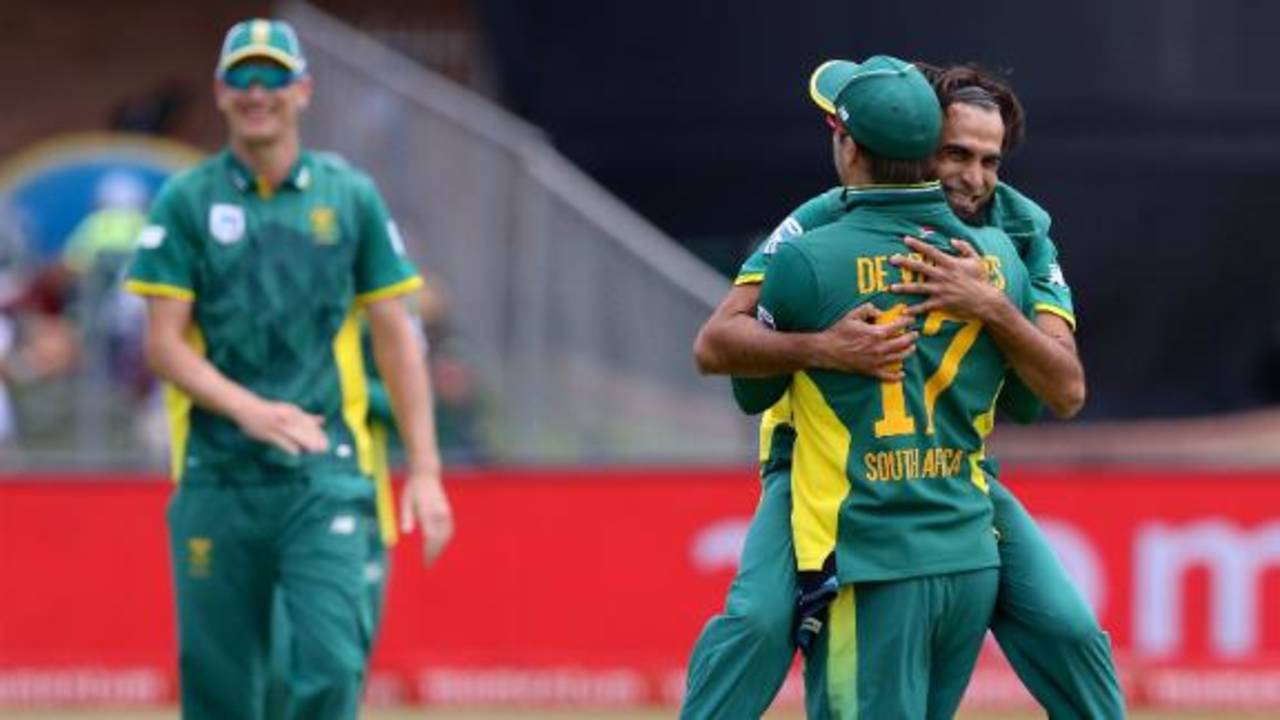'Tahir doesn't bowl bad balls anymore'
Legspinner Imran Tahir has become more steady in his bowling, and more important to South Africa's limited-overs plans than ever before
Firdose Moonda
30-Jan-2017
Although South Africa's search for an ODI opening bowler ahead of the Champions Trophy continues, their want for wickets in shorter formats has already been met - not from what may be considered a traditional source though. Rather than speed, South Africa have come to rely on spin for limited-overs success, thanks to Imran Tahir.
The legspinner is currently the top-ranked spinner on the ICC's ODI bowling charts, and third bowler overall behind Trent Boult and Mitchell Starc, and leads the T20 rankings. He was South Africa's leading wicket-taker in both limited-overs' formats last year, their top ODI bowler in 2015 and top T20 bowler in 2014. That makes him the country's most consistent bowler over the last three years and his value has not gone unnoticed.
"Immi is probably in the best kind of form that I've ever seen. He doesn't bowl bad balls anymore. He always used to take wickets but now you don't see bad balls, which makes him really difficult to play," AB de Villiers said in Port Elizabeth, after South Africa beat Sri Lanka in the first of five ODIs.
Tahir took 3 for 26 in the match and his strikes came at a crucial time in the Sri Lanka innings to underline his importance to the South African cause. He broke the 72-run stand between Dinesh Chandimal and Kusal Mendis, removed Mendis who was well set on 62, and then got rid of the Sri Lankan captain Upul Tharanga in a match-winning spell. And that's not the first time he has changed the course of a match, not even in this series.
His two wickets in an over in the first T20 derailed Sri Lanka's chase. In the third and deciding T20, his 3 for 18 kept South Africa in it and underlined how much of a go-to man he has become.
"Immi is probably in the best kind of form that I've ever seen. He always used to take wickets but now you don't see bad balls, which makes him really difficult to play."AB de Villiers
It's a far cry from the Tahir the international arena first came to know, at the end of 2011. Then, used in Test cricket, his own desperation to impress resulted in him becoming a joke without the punchline as he bowled an excessive variety of deliveries and begged for wickets he seldom got. Now, Tahir shows control, lets his legbreak do most of the talking and uses his googly with discretion. He has also become a more accomplished fielder and can be trusted to race around the boundary, slide to stop the ball and even take a relay catch like he did in the first T20 when Heino Kuhn tossed him the ball as he traveled over the rope. He said there's no clowning around when it comes to his cricket.
"I just call it hard work and I take things quite seriously," Tahir said. "Playing for South Africa is an absolute honour and I don't feel like I need to relax. Every game, I take more than seriously."
Except when he has some success. Tahir's celebrations routinely draw laughs when he sets off on victory laps that threaten to end in the stands or even outside the stadium, leaving his team-mates in the dust. Tahir has previously explained his outlandish expressions of joy as spontaneous, but they also speak to how he remains young at heart despite being the oldest member of the South African side.
At 37, "he still looks fresh out there" de Villiers said. "And the way he celebrates he looks like he could play for another 10 years."
Realistically, de Villiers does not actually expect Tahir to go that long but the captain is hopeful that his right-hand man will be part of his plans to win the 2019 World Cup. "Obviously the Champions Trophy [in England in June] is the first thing I can think of. Hopefully he'll be there, and maybe he'll push it for another two years after that," de Villiers said.
As for Tahir himself, retirement is nowhere near his plans, especially because his career started later than he may have liked as he awaited qualification for South Africa from Pakistan. He was 32 when he debuted in November 2011 and subscribes to the simple notion that for as long as he's got it, he'll keep doing it. "When I feel I am not, I will be honest with myself, but as long as the nation is happy with me, I will keep going."
Firdose Moonda is ESPNcricinfo's South Africa correspondent
